Calvary
 for sexual references, language, brief strong violence and some drug use.
for sexual references, language, brief strong violence and some drug use.
Reviewed by: Jim O'Neill
CONTRIBUTOR
| Moral Rating: | Offensive |
| Moviemaking Quality: |
|
| Primary Audience: | Adults |
| Genre: | Suspense Drama |
| Length: | 1 hr. 40 min. |
| Year of Release: | 2014 |
| USA Release: |
January 19, 2014 (festival) August 1, 2014 (limited) DVD: December 9, 2014 |
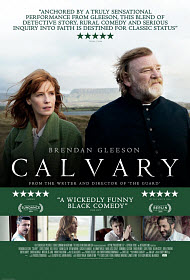
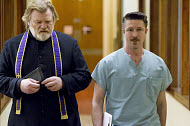
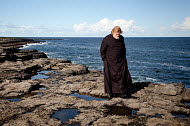
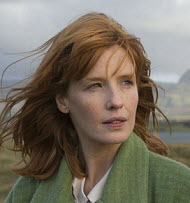
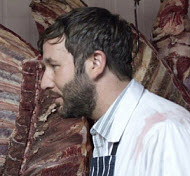
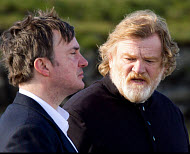
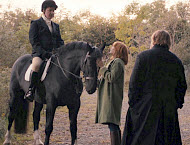
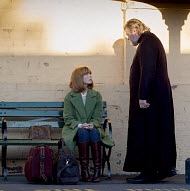

What is the Calvary referred to in the Bible?
sin and the fall of man
ORIGIN OF BAD—How did bad things come about? Answer
Did God make the world the way it is now? What kind of world would you create? Answer
Are you good enough to get to Heaven? Answer
How good is good enough? Answer
The film claims that the Bible says thou shall not “kill”. In reality, it says thou shall not murder.
about Roman Catholicism
SUICIDE—What does the Bible say? Answer
If a Christian commits suicide, will they go to Heaven? Answer
serial killer / murder
Why does God allow innocent people to suffer? Answer
What about the issue of suffering? Doesn’t this prove that there is no God and that we are on our own? Answer
Does God feel our pain? Answer
| Featuring |
|---|
|
Brendan Gleeson … Father James Chris O'Dowd … Jack Brennan Domhnall Gleeson … Freddie Joyce Kelly Reilly … Fiona Lavelle Aidan Gillen … Dr. Frank Harte Dylan Moran … Michael Fitzgerald Isaach De Bankolé … Simon M. Emmet Walsh … The Writer Marie-Josée Croze … Teresa See all » |
| Director |
| John Michael McDonagh — “The Guard” (2011) |
| Producer |
|
Irish Film Board Lipsync Productions See all » |
| Distributor |
In John Michael McDonagh’s powerful, often astonishing, film, “Calvary,” Father James Lavelle (Brendan Gleeson) is the pastor of a church in County Sligo on Ireland’s Northwest coast. Sligo is an outpost of sorts but it’s an exquisite one, full of haunting beauty and tangible sadness. You could say that civilization has passed the little province by if McDonagh’s Sligo were not a reflection of a much bigger world whose Earth and rock hold a civilization together and whose worms eat slowly away at its core.
Sligo’s inhabitants are a spirited but unprincipled bunch. All of them are fascinating, but the standouts include a butcher (Chris O’Dowd) who is indifferent to his wife’s persistent adultery, an aging writer (M. Emmet Walsh) who is so afraid of his mortality that he wants to give death a head start, a cynical doctor (Aidan Gillen) who has a Mephistophelean hunger for taking down his fellow man (his Faustian image rounded out by a pointed goatee and an ever present elfin sneer), an investment banker (Michael Fitzgerald) whose soul is as starved as his portfolio is stuffed (he makes a point of revealing how little his possessions mean to him by defiling his priciest acquisition, a Hans Hoblein painting), and the saddest of all, Fiona (Kelly Reilly), Father James’ own daughter, who is bereft from the loss of her mother to death and her father to a vocation that she has never understood. She comes to Sligo to seek some solace from her father after she recently attempted suicide.
During confession a parishioner tells Father James he was raped by a priest when he was seven years old. That priest has since died but the unknown man in the confessional still wants revenge for the crime, one that he describes in heart-wrenching and graphic detail. He threatens to kill Father James in a week’s time, on a Sunday. “There’s no point in killing a bad priest,” says the man, “but killing a good one; that’d be a shock.”
Sexual Abuse of Children by Priests—What is it? How widespread is child sexual abuse? One survivor tells her story. Includes ways to find help.
The story line is thus drawn, and so are the battle lines. Who is the man making the death threat? Is he serious? How will Father James respond to the warning? Amidst the suspense and the social conflicts that ensue, a moral and spiritual struggle emerges that forms the core of the narrative. Father James now has a crisis of his own to go along with the everyday crises that face him and his flock. He can choose to save himself and avoid the Sunday confrontation or he can go about his routine, surrendering himself and his fate to a power beyond his own. He understands that part of his responsibility to the people he serves is making himself accountable for the actions of the greater body of which he is a part. Innocent himself, he is chosen to atone for the sins of the guilty. Hardly the sheepish type, Father James becomes the spotless, or almost spotless, lamb, and in doing so becomes the defender of a people who are in desperate need of deliverance.
Father’s flock is wayward and dispersed. He constantly chases his errant sheep that for the most part prove refractory to his entreaties, but he persists in trying to save them from themselves, using his rod and his staff, and sometimes his pistol. One of the characters tells Father James: “You’re time is gone, and you don’t even realize it.” The priest responds: “My time will never be gone.” Indeed, the Sligos of this world come and go but there is another realm that will never fade away. Such is the message that each of Father James’ encounters conveys in subtle and sometimes not so subtle ways.
As played by Brendan Gleeson, Father James is pensive and conflicted, but he is also large and powerful. He speaks, listens and moves with a commanding aura that is not hindered by wind or fire or the taunts of his parishioners. Gleeson is ruggedly handsome, but he does not possess a leading man’s face. His forehead, chin and nose show the lines of a man who constantly takes on other people’s burdens. The rest of the characters look baby-faced in comparison. Most of them have inflicted their burdens onto someone else and they haven’t a single line on their smooth pink faces. I admired Gleeson in McDonagh’s last film, “The Guard” in which he played Gerry Boyle, an unconventional Irish cop who was investigating a cocaine smuggling outfit. Gleeson’s Boyle was full of sarcastic wit and clownish sensuality. I wondered if his Father James would be a penitent or reformed version of Boyle, but Gleeson has created a new and original character, one whose presence and authority are far from clownish. The performance is remarkable; it is as good as screen acting gets. His priest goes way beyond the joviality of Barry Fitzgerald and Bing Crosby (“Going My Way”), the intensity of Gregory Peck (“The Keys of the Kingdom”) and the introversion of Montgomery Clift (“I, Confess”). Gleeson’s large belly, round face and untamed hair do not point as much to an overflowing physicality as to a boundless spirit. His very abundance alludes to a sphere beyond the mere mortal.
The film’s structure keeps the viewer focused on the drama at hand, the concern about if and when Father James’ would-be killer is going to show himself. The story’s course moves quickly toward a fatal reckoning even as you find yourself yearning for a deus-ex-machina that will make all things right in the end. If anyone deserves a happy ending it is certainly Father James. But one scene on an airport tarmac puts a nail in the coffin—almost literally—for Sligo, a modern day Gomorrah. There is no escape at that point. Someone has to take a stand in what has now become a cosmic struggle of good versus evil.
It is during and immediately after the film’s unsparingly violent climax when grace and virtue finally break through. The film’s final scenes are as moving as anything you are likely to see on a screen, a combination of things heartbreaking and hopeful, of faces wet with tears but still bearing that look of love that all humanity craves. Death may be fearsome and dark, but faith tempers those fears and shines a light in that darkness.
“Calvary” is an Irish wake of a movie; it’s sad, and it has a lot to mourn over, but in that grief an epiphany emerges. When everything is gone and all that remains is charity, one realizes that anything else was never that important or fundamental. Even in death one must make room for friendship, love and a good time. This stunning film makes room for all of those, and more.
Violence: Heavy / Profanity: Extreme—“Jesus Christ” (2), “Jesus” (1), “For Christ's sakes” (1), “For God's sakes” (1), “Oh God” (1), “God” (1), hell (5), f-words (numerous), s-words, slang words for genitals, ass (4) / Sex/Nudity: Moderate
See list of Relevant Issues—questions-and-answers.


First of all, we have the character of Father James. In so many films, Christians are portrayed as either hypocritical idiots who spout cheesy clichés or as angelic beings devoid of any doubts or struggles. Father James falls into neither stereotype. He dedicates himself to serve others, but he doesn’t just babble Bible verses or cast judgmental looks. Instead, he listens to others and offers Biblical guidance with a heavy dose of common sense and witty humor.
To me, it felt like he was “casting pearls before swine,” but he kept going, even as his advice was ignored and his faith openly mocked. In addition to abuse from the community, he has his own struggles: a previous drinking problem, a volatile temper and a broken relationship with his suicidal daughter. Here is a man with serious issues—not some holier-than-thou saint—who continually sacrifices himself for the sake of an undeserving, disrespectful populace. He is the very definition of what it means to be a Christian in my opinion.
Secondly, I think “Calvary” is better than many Christian-made movies because it is honest. There is no sugar-coating or hand-holding. It brings you face-to-face with the ugliness of sin and makes you watch as Father James struggles to reconcile his faith with the harsh realities around him. At times, it’s painful and depressing, as is life. There are never any simple solutions, because the problems the people face are too complex for pat Sunday School answers; Father James isn’t afraid to admit he doesn’t know how to respond to some queries. There is no neatly packaged Gospel message and scene of repentance.
Yet, amid the chilling evil and despondency there is a tiny glimmer of hope, most obviously discussed in a conversation between Father James and his daughter: Father James: “I think there’s too much talk about sins and not enough about virtues.” Fiona: “What would be your number one?” Father James: “I think forgiveness has been highly underrated.
As the personification of Christianity in the film, Father James looks evil square in the eye and doesn’t flinch or alter his position. In the end, he pays very dearly for it, but his ideal of forgiveness plays out powerfully in the closing of the film.
Moral rating: Offensive / Moviemaking quality: 4
This film was rated all 100s by the big city critics! I wonder if ever they watch the movies they rate. Nuts, if we had left before the end of the movie I could have got my money back. I would not recommend this movie to any normal person. It was a waste of money and time. I like to feel good when I leave the theater this movie made me feel angry for wasting money and time to see this sick story.
Moral rating: Extremely Offensive / Moviemaking quality: 2
PLEASE share your observations and insights to be posted here.


However, that is a side issue, the main point is that the portrayal of the priest by Gleason is a tour de force, powerful yet humble, scared yet brave. Facing more than one difficult moral choice. The film presents him living in a very fallen world which has little time for him. Maybe not a Christ-figure exactly, but certainly a Christ-follower in a hostile world.
My Ratings: Moral rating: Better than Average / Moviemaking quality: 4½